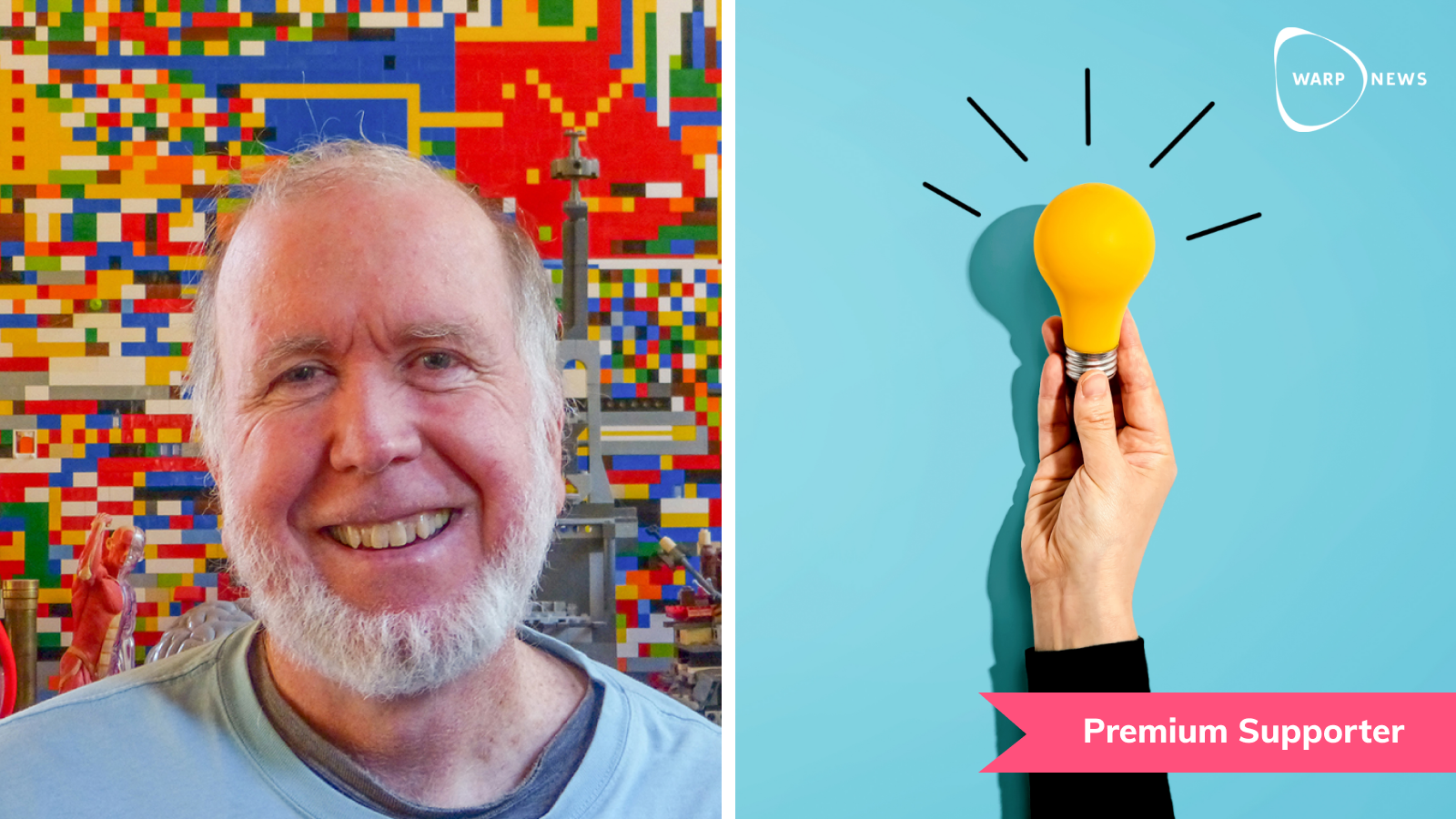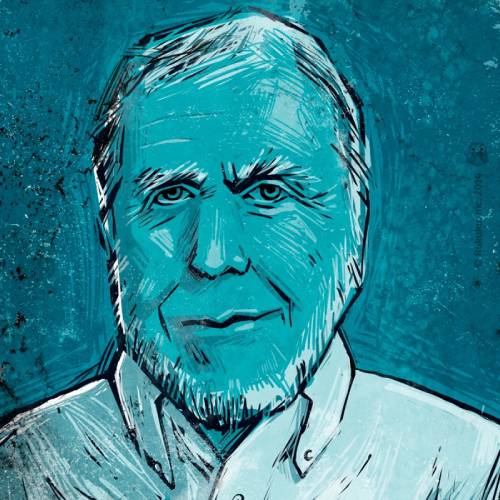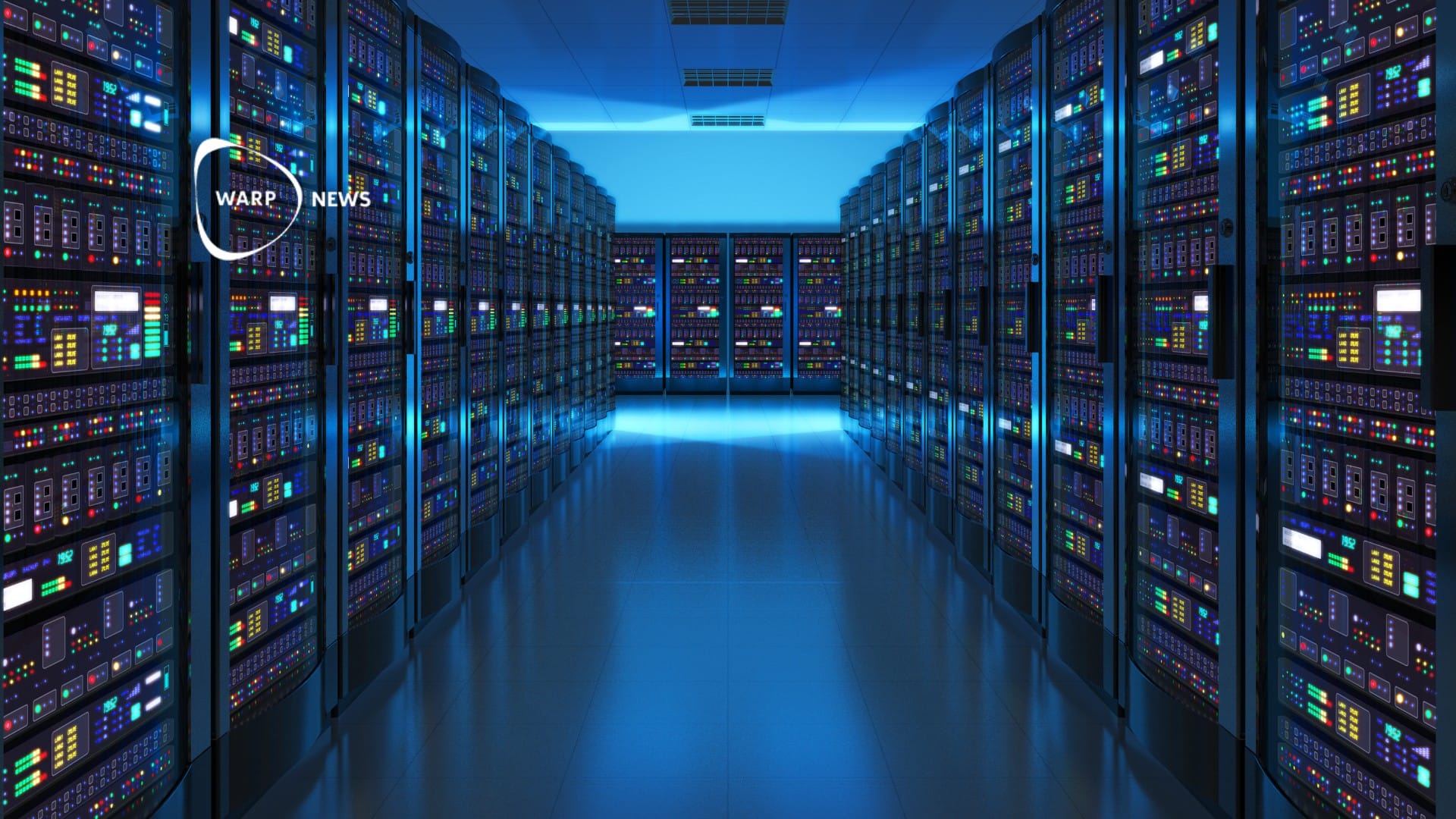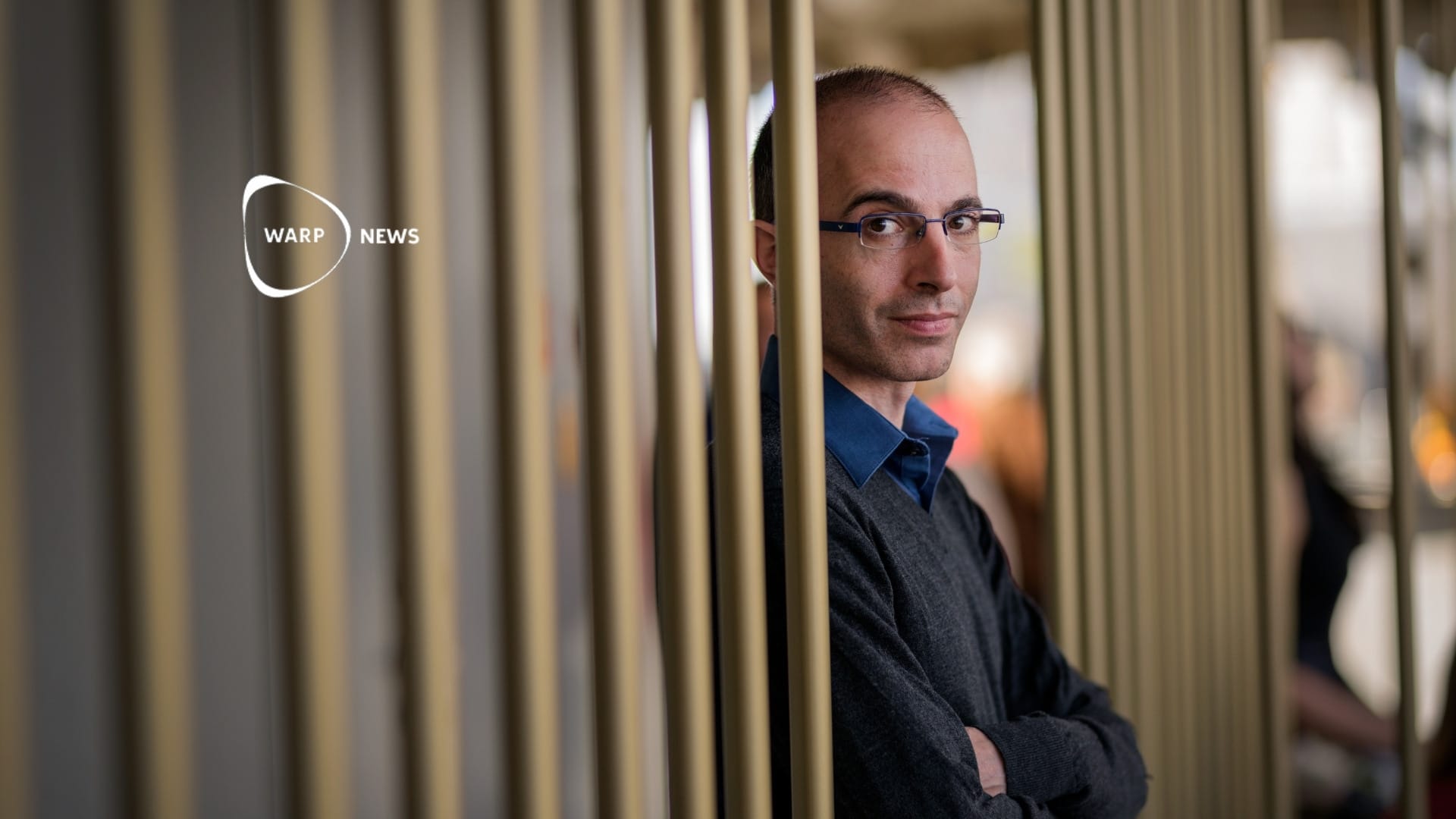
💡 Kevin Kelly: The Case for Optimism
Kevin Kelly is the founder of Wired Magazine and author of several books, among them The Inevitable. For Warp News he presents his case for optimism.
Share this story!
Sign up for our free weekly newsletter with fact-based optimistic news on technology, science and human progress.
There are two important sets of reasons why you should be optimistic right now. One is the general case for optimism at any time. The second reason is a handful of forces at work in the world that make specific cases for optimism at this particular time, in 2021.
I start with a handful of reasons why we should adopt the stance of optimism whenever we can:
Pre-visualize success
It is extremely difficult to create a desirable future without first envisioning it. To imagine is really the first step in creating anything. Therefore an essential chore for making a future we want to live in, is to imagine what it is like and how we get there. That plausible path is a form of optimism. Believing it is possible makes it more likely to happen. When hurdles and setbacks arise -- and they will -- the belief in its possibility serves as motivation. History is filled with accounts of people who held an optimistic belief others thought unlikely, or even impossible. This optimistic previsualization is a necessary component of change. Since we can not be certain of the future, optimism is only a belief -- a stance that could be incorrect. On the surface, an optimistic belief might seem no more valid than the stance of pessimism. But the deep history of new ideas makes it very clear that the optimistic stance of believing something is possible is a requirement to make anything new real, and is thus more powerful than pessimism. In the long run, optimists shape the future.
Civilization requires optimism
Civilization depends on an implicit degree of general optimism. It is a collaborative exercise. Civilization amplifies and accumulates cooperation between strangers. If you expect that you can trust a stranger, that is optimism. If you expect to be cheated or hurt, that is pessimism. Societies that bring the most good to the most people, require that people be trusted more than they are distrusted; that they expect more good than harm; they require that people in general have more hope than fear. Societies that have more pessimism than optimism tend not to prosper. The default stance in any thriving civilization is optimistic: it operates on the assumption that in general, most people, most of the time, will cooperate. They can be trusted to be honest and this cooperation will produce positive results that add up to more than the sum. Civilization requires trust; trust requires optimism; civilization requires optimism.
Long termism
Humanity progresses by accruing advantages that operate over the long term. The best civilizations create things that take generations to build and whose benefits reward not the builders but those who come after them. Present benefits in fact may be sacrificed for greater benefits to future generations. That is called being a good ancestor.
To be a good ancestor one must assume that good things can be forwarded. Thus, in order to think long term, you can’t be pessimistic. In a real sense, you must trust the future -- and that is optimism. An optimistic longview enables us to forgo cheap gains in the short run that can pay out greater over the long haul. It can enable us to pay a price now to be ready for the inevitable disasters and harm that will surely come over time (pandemics, storms, asteroid hits). It means stockpiling during surplus for the famines that will happen. Optimism enables us to reach good and great things beyond the capability of a single generation.
Asymmetric possibilities
All the evidence so far indicates that there are no limits for knowledge or improvement. We’ve encountered nothing we can’t potentially improve. Every question answered by science generates at least two new questions, two new territories of unknown things that we now know we don’t know. In this way our ignorance expands faster than our knowledge, which is healthy. Because behind this expansion there is a great asymmetry: what is knowable but still unknown will always be larger than what we already know, meaning there are more possibilities waiting to be discovered than have already been discovered. This asymmetry in knowledge is reason to be optimistic, because it means there are no limits to our improvement. We can always imagine a better way -- and we are also always improving what/who the “we” is. Optimism recognizes that our potential for improvement is infinite in all directions.
Historical progress
A fair and rational evaluation of the scientific evidence demonstrates that progress is real over historical times. Progress is particularly evident in the last several centuries ever since science has been put into practice. The evidence is unambiguous that lifespans, security, well-being and opportunities for the average person have increased. So, on average, the optimistic view has been correct over longer time frames. There is no guarantee that this long run of progress will continue forward. It could happen that after 10 centuries it suddenly stops. While that sudden stop is possible, it is statistically more probable that it will continue, at least for several more decades. This long and on-going trend operates on a scale way beyond our own lifetimes. It is a phenomenon far bigger than ourselves. Being optimistic puts you in alignment with the long arc of history, and a part of something much bigger than yourself.
Deeper currents
However, progress is not the prevailing view in 2021. The ills of society are very visible and the future is assumed to be bleak. There are three reasons why people tend to believe things are getting worse rather than better.
1) Progress is mostly about what does not happen. Progress means a 92-year-old who did not die today, a boy who was not robbed on his way to school, a 12-year girl who is not married to a 30-year old man, etc. What did not happen does not make the news. The best parts of civilization don’t get headlined.
2) Bad things happen fast, while good things take longer. So when we ask what has happened in the last news cycle (the last five minutes) only fast moving things show up, which are mostly bad news. Good takes longer than a news cycle. So most news, in any media, even responsible ones, is bad news. If newspapers and websites were only updated every 50 years, they might report: literacy is up, longevity increased, violence is down.
3) The solutions to most problems will create new problems. But if we can create 1% more solutions than problems, that 1% compounded over decades equals civilization. However 1% of almost anything is invisible in the now, lost in the noise. Such a small differential is really only visible in accumulation and seen in retrospect.
Optimism is therefore inherently hard to see in real life. It is a deeper current that requires counting things carefully, not just listening to tantalizing anecdotes. Optimism is also assumed to be a future-pointed thing. But optimism also springs out of a deep look at the past. Optimism looks past the superficial to reckon with the essence of deeper change.
Healthy resilience
Optimism yields happier and more resilient people. Optimism equips people a greater ability to deal with hardship, and less stress in their lives. Optimism can be learned, especially by children. The psychological temperament of an optimist is not a sunny disposition or a pollyanna delusion that everything is ideal. Rather, optimists believe that bad things are produced by temporary causes that can be overcomed, while pessimists believe bad things always happen, and if anything good happens it’s temporary.
It’s a swap of the default, from the universe is conspiring against you, to the universe is conspiring for you. Studies by psychologists show that those who adopt the optimistic assumption are more resilient, better able to adapt and thrive, while the pessimistic struggle more. Everyone is born with a different bias, but a child’s assumption can be shifted toward a more optimistic and resilient view by parenting, training, and education. In this regard optimism is a skill that anyone can get better at. Likewise, at the society level, Optimism is a skill that bestows resilience and adaptability.
Future ingenuity
Optimism is not utopian. It’s protopian -- a slow march toward incremental betterment. Over time we continue to get better not only in living standards, but in being able to solve problems. Each year we know a little more, including how to fix things. But the cost of that overall betterment is a barrage of bewildering new problems brought on by progress. We can easily imagine some of the horrific downsides in future scenarios, but the biggest and most difficult problems in the future are actually beyond our capacity to predict. We can’t even imagine the worst. But as bad as the world’s future problems will be, the reason we can and should be optimistic is that our estimates of future woes don’t take into account our ability to solve them. The ultimate reason we should (and can) be optimistic is not because we must ignore the reality of huge, planetary-scale illnesses and deep systemic problems. We should be optimistic not because our problems are smaller than we thought, but because our capacity to solve them is larger than we thought.

These are the good reasons to be optimistic at any time we can. But besides these general reasons there are particular reasons to be optimistic right now in 2021.
The next 25 years are very likely to be an era of global progress that will exceed the achievements of the last 25 years. The next human generation will experience -- on average, and in aggregate -- living standards and possibilities that will reach a record high level for this planet. The distribution of this progress will still be uneven, but all regions will experience more advancement than they have in the past. Given the dire past year, this seems like a wildly optimistic claim.
But the evidence for near-term global prosperity -- on average -- is already happening. Each of the seven trends I list here are large forces that happen only once on a planet. Each of them have a huge momentum behind them that is not easily derailed. And they will accelerate and deepen in the coming decades. These seven forces are like a tailwind that will drive progress and prosperity, and are worthy of being optimistic about.
1) Total Urbanization
Today’s widespread middle class living standard is the result of several one-time events for the planet, such as mass migration into cities, the movement of women into the formal working economy, and pervasive automation of labor. The first driver of optimism is therefore simply a continuation and completion of the on-going industrial revolution. While modernization has already played out in the developed countries, it has not saturated many developing parts of the world. That will change in the next 25 years, as almost everyone alive will experience modernity.
Some 90% of the planet’s inhabitants will be living in urban areas, relying on large-scale infrastructure to provide water, food, shelter, transportation, education, and health care. We will complete the urbanization of the planet, with the bulk of its inhabitants living in urban areas, defined as within 20 km of a hospital or health clinic. Urbanization provides the benefits of density, such as higher bandwidth, and more diverse jobs. These improvements are desired by most young people around the planet. Ask them what their dream is and they will tell you they want t-shirts and sneakers, an air-conditioned room with plumbing and wifi, and a job doing something of their choosing. Total urbanization is more than just making life convenient; dense urbanization leads to more, faster innovation, and prosperity for all, including those outside the urban area. Most importantly, this wide-spread modernity, while an end in itself, is an enabling force that supports and enables the following six forces for optimism.
2) Universal Connectivity
For the first time on the planet, all adult beings will be connected together. The penetration of connected devices is likely to reach 100%. This vast connection creates a huge continuous audience, a planet-scale market, and potentially unified global movements. A start-up in a small country has a greater chance than ever of having a vast billion-person customer base. Vast global audiences not only finance mega cultural creations, they also provide hundreds of millions of niche markets, a boon for creators, art, and commerce in any town on the planet. Global commerce increases, the global exchange of culture is enhanced (K-pop and K-dramas everywhere!), and best practices are spread around the globe. Universal connection is a new tool for harnessing the resident genius in 8 billion people no matter where they live.
When all adults on a planet connect, they can cooperate at a scale and speed never before possible. Existing large institutions are also enhanced by this acceleration, while entirely new forms of collaboration are now possible. In the next two decades we will likely witness at least one grand project created by one million people around the globe working together on it in real time -- a feat enabled by universal connectivity. When all 8 billion people are connected together we have more of a chance to prosper together.
3) Ubiquitous AI
Up until the industrial revolution anything that humans made, including cities and roads, had to be made with the energy of organic muscles (human or animal), which was drastically limited. With the advent of cheap artificial power, we could erect tall skyscrapers, vast continental railroads, immense factories, and mass manufacturing -- all way beyond what meat muscles could do. We have started to do the same with our natural thinking muscles, by seeding the world with artificial intelligences. A zoo of hundreds of different species of new types of mind will be working with humans to solve problems. These non-human minds (sometimes with bodies we call robots) will do work humans don’t want to do, or can’t do. Humans and AIs together will co-create new desires and new jobs. The long-term driver of progress -- automating physical jobs -- will continue, and then begin to take over non-physical chores as well. The three chief consequences of AI will be the liberation of humans from their unwanted jobs, the explosion of new services and formerly impossible products that are co-created with AIs, and new occupations and desirable tasks for humans. AIs and robots are designed for efficiency and productivity, while these millions of new human jobs are primarily tasks where inefficiency is tolerated. To excel in innovation, entrepreneurship, art, caring, hospitality, science and discovery, humans must try things that don’t work, embrace failures, encourage small talk and playfulness -- all inefficient. Efficiency is for robots. Ubiquitous AI is the most optimistic force we can imagine.
4) Sustainable Energy
The industrial revolution was fueled by burning a limited supply of easy to get cheap carbon. The world’s population, and market economy boomed in parallel to our discovery and use of carbon fuel. That was a one-time boon for progress. In the coming decades, we will switch to unlimited energy from solar, wind, hydro and nuclear. We can double our energy efficiency simply by decarbonizing the economy. In fact we can achieve 50% of what we need for climate change simply by powering all of our machines, furnaces, and vehicles with electrons instead of oxidation. We will use electric heat pumps instead of burning carbon in furnaces, electric motors instead of hot jet engines, cool electric cars instead of polluting gas engines, and LEDs everywhere. In addition to helping with climate change, electrifying everything will yield countless opportunities for business and employment in redesigning transportation, shelter, and civic infrastructure. Since so many of us will live in cities (which increases sustainability), this trend also raises millions of opportunities for the greening (and increased quality) of urban life.
5) Accelerated Innovation
In addition to the speedups brought by dense urbanity and universal connectivity, new learning tools are accelerating the velocity of innovation, which accelerates prosperity. This is a cause for optimism. The technologies of AI, advances in the scientific method, and rampant use of prosumer media like today’s YouTube, accelerate the speed and spread of knowledge. YouTube and Youku (in China) in particular are underappreciated learning accelerants. It’s not just make-up tutorials and workshop maker videos. Brain surgeons upload their latest techniques to YouTube which other brain surgeons watch, then innovate on, and share their videos within days. Almost every scientific talk or industry presentation is recorded and shared widely, and oftentimes analyzed and explained by another YouTube video. Until now deliberate, systemic innovation has been hit or miss. Sometimes seen in science and engineering; more recently imported into tech businesses. But intentional systemic innovation was still absent in government, education, military, social services, and civic infrastructure. Now For the first time innovation is being applied deliberately and effectively throughout society, and it will be expected.
Innovation in any field is the new norm, at least the norm to aim for. Best practices for innovation, universal connectivity, and new media including the augmented realities of smart glasses -- even better video teaching -- provide the tool for accelerated learning. These tools are starting to give us metrics to measure real learning, and thus ways to optimize learning in different situations. In particular, education itself will be amplified by AI, tech, and globalization, till learning overflows the confines of schools and is more embedded for lifelong learning in work and personal life. When learning accelerates everything else does as well.
6) Bio-Engineering
For the first time we will engineer biology, both of ourselves and other species, existing and invented. This has been a long promise of technology -- and it will take centuries to fulfill -- but the force is already beginning to work. Witness the speed at which we humans created Covid-19 vaccines, and the tremendous life-and-death difference they made. Our response to the pandemic should be a cause of optimism rather than despair. Much of this success is due to our collection of genetic data at a huge scale which will continue and accelerate. Further increasing control of living systems at their foundational level will provide great progress in our own longevity and wellness. But this revolution also gives us powers to create new materials, new forms, new goods, new foods that we’ve only dreamed of before. One small example is deathless meat grown from animal cells, which has a different ecological footprint and the potential to taste even better than natural meat from killed animals. In the next two decades we are likely to be able to sell proxy fish grown from fish cells, and begin the elimination of harvesting wild fish before their extinction. Establishing vast no-fishing wilderness parks in the ocean would be a tremendous boon to the planet. The benefits of biotech are much slower to happen than other tech, but much greater in impact. The arrival of biotech may be the best reason to be optimistic.
7) Generational Handoff
The world-wide Boomer generation will be retired and made redundant in 25 years. The next generation will come of age. This is good news for the world, because the young have better ideas, and the ambition to see their change come about. All around the world this new generation will have grown up studying the same curriculum in school. Their textbooks always include math, science, history, literature, and usually these days, English.
They will be accelerated learners with access to free online encyclopedias, libraries of books scanned for free, and the entire universe of video tutorials. Universal real-time language translation in ear pods -- which will be available in a few years -- will unleash the skills of billions of this generation. Many fantastic youths in far-flung places may have all the coveted skills required by a remote employer -- except the skill of English. With universal real-time translation this is no longer a problem, and they can easily join the global economy -- raising the prosperity of them and everyone else. For the most part this generation has their goals set by the best on the planet. They know what is possible. If generational history is any guide, this global generation will be very civic-oriented and will be eager builders. They are more optimistic than Boomers and won’t be asking permission. One survey by the World Economic Forum asked 26,000 young people between the ages of 18-35 whether the world was full of opportunities or struggles. Over 70% of those millennials were optimistic, believing (correctly I’d say) that there were more opportunities than struggles.
A caveat: I am talking about the state of the world and its future on average global terms. Even an extremely healthy person will have local ailments and small injuries on their bodies every day. In fact some of the healthiest people on the planet -- professional athletes -- have constant pains and injuries as a consequence of their extraordinary achievements. Local harms are the norm. In the same way, even in a world of indisputable progress not all regions will experience the same health. Parts of the globe may suffer war, disease, famine, unrest in times of prosperity. It may be very bleak in some areas, where pessimism seems totally appropriate. History suggests these bleak times are temporary, and that on average, better times will come. The case for optimism is a longer-term view, and a bigger-place view. Based on the evidence, we should be able to picture progress at the scale of two decades around the planet for the average person, even if there are scars of inequality throughout it.
Civilization is a worthy goal to aim for. To build a better civilization, optimism is the most rational, realistic and helpful stance to take right now. These reasons for optimism are so strong that I believe we have a moral duty to be as optimistic as we can. As individuals we’d be more resilient and satisfied being aligned with something bigger than ourselves. As a society, we’d be better ancestors and stewards of what we have inherited from previous generations. And we’d be better prepared for the best possible future we can imagine.
Kevin Kelly is the founder of Wired Magazine and author of several books, among them The Inevitable. His TED talks have been viewed over 7 million times.
Sign up for our free weekly newsletter with fact-based optimistic news on technology, science and human progress.
By becoming a premium supporter, you help in the creation and sharing of fact-based optimistic news all over the world.


